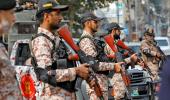Pakistanis on Thursday began voting in the general elections to elect a new government to rule the cash-strapped country amid speculation that former prime minister Nawaz Sharif's PML-N may emerge as the largest party in Parliament as it is backed by the powerful military.

The polling started at 8.00 AM and will continue without any break till 5.00 PM. A countrywide public holiday has been declared to enable a total of 128,585,760 registered voters to cast their votes.
The counting will start soon after the conclusion of the voting.
Nearly 650,000 security personnel have been deployed across the country as more than 12.85 crore registered voters will cast their ballots at 90,000 polling stations. Pakistan has decided to temporarily suspend the mobile service due to the threat of militancy.
With former prime minister Imran Khan in jail, Sharif's Pakistan Muslim League-Nawaz (PML-N) is tipped to emerge as the single largest party in the elections.
Khan's Pakistan Tehreek-e-Insaf (PTI) candidates are contesting the polls independently after the Supreme Court upheld the decision of the election commission to deprive his party of its iconic election symbol cricket 'bat'.
In a brief pre-recorded message, the jailed founding chairman of PTI urged voters to use their ballot.
"Make sure you come out and Vote in huge numbers tomorrow," he was quoted as saying in a video posted on his X handle.
Sharif, 74, will be eying the premiership for a record fourth time.
The contest also involves the Pakistan Peoples Party (PPP) of Bilawal Bhutto-Zardari, who has been declared as the party's prime minister face.
Stepped-up security is imperative given the spree of violence with the latest being two devastating bomb blasts targeting election offices on Wednesday in the restive Balochistan province that saw at least 30 people killed and more than 40 others injured.
Punjab has the most number of 73,207,896 registered voters followed by Sindh with 26,994,769, Khyber Pakhtunkhwa with 21,928,119, Balochistan with 5,371,947 and Federal Capital Islamabad 1,083,029.
According to ECP, a total of 5,121 candidates are in the race for the National Assembly (NA) seats. These include 4807 male, 312 female and two transgenders. For the four provincial assemblies, 12,695 candidates are in the field including 12,123 males, 570 women and two transgenders.
In total 266 NA seats were up for grabs out of 336, but polling was postponed on at least one seat after a candidate was killed in a gun attack in Bajaur. Sixty seats are reserved for women and another 10 for minorities, and are allotted to the winning parties on the basis of proportional representation.
Another 593 seats of the four provincial assemblies, out of a total 749, were open for contest but the ECP delayed polls on at least three seats, two in Khyber-Pakhtunkhwa and one in Punjab, after two candidates died and one was killed.
A total of 132 seats in the four provinces are reserved for women in four provinces and another 24 for minorities.
The reserved seats will be allotted to the winning political parties on the basis of the general seats they win in the elections. Both women and non-Muslim minorities can also contest on all general seats in addition to the reserved seats set aside for them in the national and provincial assemblies.
Whoever wins the Feb 8 polls will find a daunting task ahead due to the dwindling economy and deteriorating security situation.
Last year, the country narrowly averted a default when the International Monetary Fund provided a USD 3 billion short-term loan.
Economic experts believe that the new government would need an urgent new IMF programme on more stringent conditions.
Pakistan's more than two-decades-old fight against terrorism is also unravelling as the rebels have resurged since 2021 after the Afghan Taliban came to power.
The new government will find it tougher to deal with the militancy by the banned Tehreek-i-Taliban Pakistan and Baloch nationalists.











 © 2025
© 2025